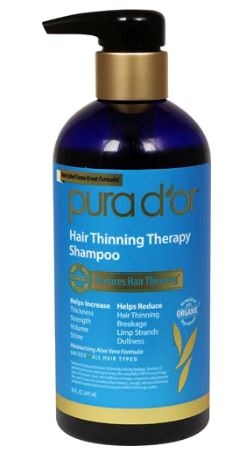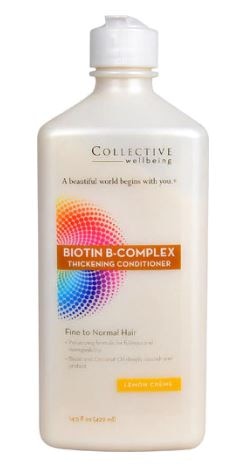Concerned about thinning hair? Not to worry! We’ve outlined some common causes and treatments for minor to moderate hair loss, plus ways to prevent your luscious locks from dwindling in the first place.
Why is my hair falling out?
According to the American Academy of Dermatology (AAD), the average person sheds between 50 and 100 hairs per day. But if you’re losing an excess of 100 strands daily, you may be experiencing hair thinning. Please note that thinning hair differs from alopecia, a condition characterized by widespread hair loss.
Causes of thinning hair may include genetics, lifestyle habits or a combination of the two, including:
- Over-treating hair. Coloring, relaxing or perming hair too frequently may result in thinning.
- Mistreating hair. Using harsh products (e.g., extreme-hold gels or sprays) or pulling hair too tightly (e.g., tight bun or ponytail), can cause hair to thin.
- Nutritional deficiency. A lack of folic acid, iron and other dietary minerals can result in hair loss.
- Unregulated stress. An increase in stress hormones, such as cortisol, my prevent new hair growth.
- Hormonal changes. Recent childbirth or discontinuing use of birth control pills can cause hair to become thinner.
- Rapid weight loss. Losing 20 or more pounds in a short time frame can cause hair thinning.
- Certain medical conditions. Thinning may also be triggered by immune system deficiencies, skin infections, eating disorders and other medical conditions.
Less commonly, hair thinning may be caused by trichotillomania, a disorder characterized by repeatedly pulling out one’s hair.*
Hair thinning treatment & prevention
Locks looking a little too sparse for your liking? Following are some simple ways to help restore your mane to its former glory:
- Up your protein intake. Adding more protein to your diet (e.g., eggs, almonds, lean meat) may help prevent or remedy thinning hair.
- Eat more essential fatty acids. Omega-3 fatty acids help fight inflammation, which can trigger hair loss. Omega-6 fatty acids promote skin health, which can benefit your scalp and hair. The body doesn’t produce essential fatty acids, but you can find them in foods like eggs, meat, poultry, fatty fish (e.g., anchovies, mackerel, trout), nuts and seeds.
- Check for vitamin deficiencies. Low levels of certain vitamins and minerals may result in hair loss. A simple blood test can help determine if you are deficient in these nutrients. Depending on the results, your physician may recommend a multivitamin or Vitamin D, B12, iron, folic acid and/or zinc supplements, among others.
- Be gentle on hair. Take periodic breaks from heat styling your hair. Also give the tight ponytails and/or hair extensions a rest. Letting your locks hang loose places less strain on your hair follicles, which can help prevent thinning—or stop it in its tracks.
- Pay attention to your body. Thinning accompanied by other symptoms, such as dry skin, weight gain and fatigue, may be a sign of a thyroid condition. If you experience a combination of these symptoms, consult a physician regarding treatment.
- Use a thinning shampoo. These have been specially formulated to reduce thinning and increase strength, thickness and volume of hair. Be sure to massage your scalp to promote blood flow and remove dead skin cells while washing. Two to try: Pura D'or Hair Thinning Therapy Shampoo and Avalon Organics Therapy Biotin-B-Complex Thickening Shampoo.
- Follow with a thickening conditioner. This can also help to strengthen strands and restore body to thinning hair. We recommend Avalon Organics Biotin-B-Complex Thickening Conditioner and Life-Flo Collective Wellbeing Biotin B-Complex Lemon Crème Thickening Conditioner!
- Live a healthy lifestyle. Your locks are a reflection of your overall health. So, if you want them to appear thicker and shinier, adhere to a healthy diet, exercise regularly and aim for seven to nine hours of sleep each night.
- Hair loss medications. Minoxidil is an over-the-counter treatment that has been approved by the U.S. Food and Drug Administration (FDA) for hair loss. It is available in liquid and foam formulas and may increase hair thickness when applied twice daily to the scalp. Finasteride is a prescription medication approved for use in men who experience hair thinning and/or loss. It is available in pill form.
Give these a try:

New Chapter Only One Multivitamin

Pura D'or Hair Thinning Therapy Shampoo

Life-Flo Collective Wellbeing Biotin B-Complex Thickening Conditioner
*Please consult a physician before beginning a new treatment regimen. Treatment may vary by individual and technique and results may not be evident for several months.




